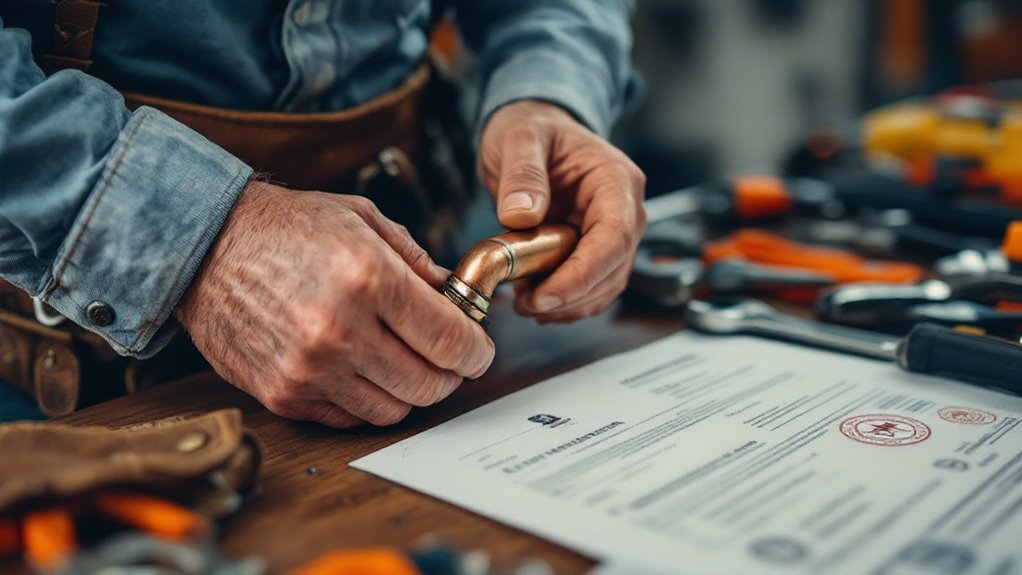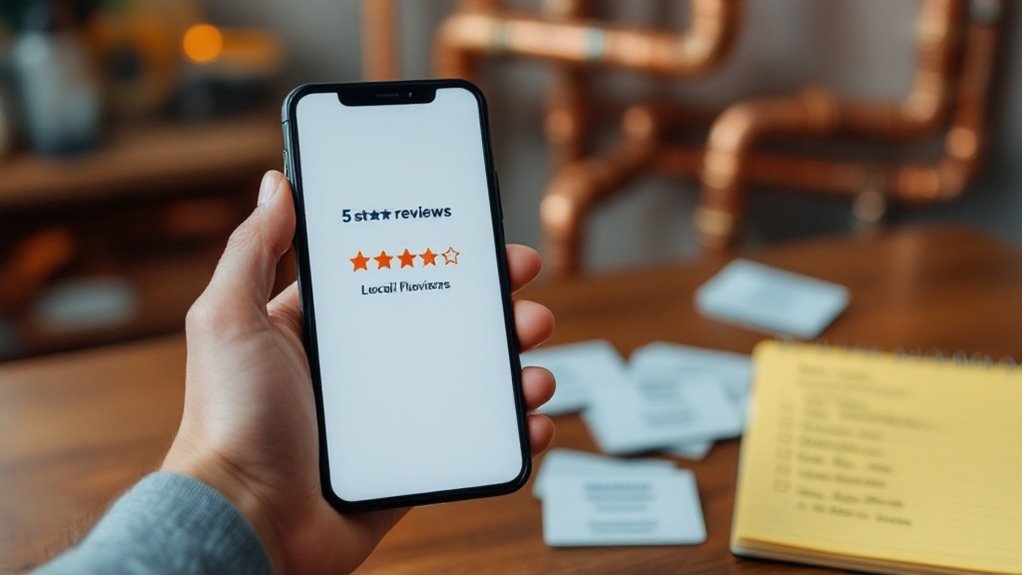When choosing a plumber, you'll want to verify they have proper licensing, insurance, and at least 5 years of experience. Check multiple review sites, ask neighbors for recommendations, and request references from recent jobs. Compare service rates, which typically range from $75-200 per hour, and understand their warranty terms. Don't forget to confirm their emergency availability and service area coverage. Taking these steps now will help guarantee you find a reliable professional for your plumbing needs.
Key Qualifications to Look For

When it comes to finding a qualified plumber, you'll want to check for several key credentials that separate the professionals from the amateurs.
First, verify their experience level – a minimum of 5 years in the field shows they've handled various plumbing challenges. Ask about their professional affiliations, as membership in organizations like the Plumbing-Heating-Cooling Contractors Association demonstrates commitment to industry standards.
Look for proper licensing through your state's contractor board, and don't forget to check if they carry both liability insurance and workers' compensation coverage.
A qualified plumber should also provide references from recent jobs, particularly ones similar to your project. Have they worked on homes in your neighborhood? Do they specialize in the type of plumbing work you need?
These questions will help guarantee you're hiring a true professional.
Licensing and Insurance Requirements
Proper licensing and insurance stand as your first line of defense when hiring a plumber for your home. When you're checking state regulations, don't hesitate to ask for proof of both a current license and insurance coverage. A legitimate plumber will gladly show these documents!
| Document Type | What to Check | Why It Matters |
|---|---|---|
| License | Expiration Date | Guarantees Legal Operation |
| Insurance | Coverage Amount | Protects Your Property |
| Bond | Active Status | Financial Protection |
| Certifications | Specializations | Technical Expertise |
| Worker's Comp | Policy Status | Liability Coverage |
Remember that plumber certifications vary by state, so you'll want to verify requirements in your area. Have you checked your local licensing board's website? It's a great place to start your research and confirm that your potential plumber meets all necessary qualifications.
Reading Reviews and Getting References

Beyond checking licenses and insurance, diligent research into a plumber's reputation can save you significant headaches down the road.
You'll want to explore both online platforms and word of mouth to build a complete picture of their work quality and reliability.
Here's what to look for when researching a plumber's reputation:
- Check multiple review sites like Google, Yelp, and BBB, looking for consistent patterns in feedback rather than focusing on isolated reviews.
- Ask neighbors and local social media groups about their experiences, as word of mouth often reveals insights that online reviews miss.
- Request references from the plumber's recent jobs, and don't hesitate to contact these customers about their satisfaction.
Remember to pay attention to how the plumber responds to negative reviews – it often tells you more than the positive ones!
Understanding Service Rates and Fees
Plumbing service rates can feel like a maze of confusing numbers and terms at first glance. When you're calling plumbers for quotes, you'll want to understand the two main pricing structures: hourly rates and flat fees.
Hourly rates typically range from $75-200 per hour, with many plumbers charging a minimum service call fee on top of that.
Expect to pay $75-200 per hour for plumbing services, plus an initial service fee just to get them to your door.
Flat fees are often used for common repairs like unclogging drains or replacing water heaters. While they might seem higher upfront, they can actually save you money since you won't get charged for extra time if the job takes longer than expected.
Don't forget to ask about emergency rates, travel fees, and parts markup – these extras can greatly impact your final bill.
What's better for you: hourly or flat rate pricing?
Emergency Response Capabilities

When your pipes burst at 2 AM or sewage starts backing up during a holiday dinner, you'll need a plumber who can respond right away!
Emergency response capabilities can make the difference between minor water damage and a flooded basement, so don't wait until disaster strikes to find out about a plumber's service reliability.
Here's what to look for in emergency plumbing services:
- Guaranteed response time of 60 minutes or less for true emergencies
- 24/7 availability, including holidays and weekends
- Multiple service vehicles equipped for common emergency repairs
Ask potential plumbers about their after-hours protocols and whether they use an answering service or direct line.
You'll want someone who maintains dedicated emergency crews and doesn't just forward calls to an on-call technician.
Service Area and Availability
A plumber's service area can make or break your chances of getting timely help for your home's plumbing needs. Before hiring anyone, confirm their primary service area and ask about additional travel fees for locations outside their usual coverage zone.
You'll want to evaluate their scheduling flexibility, too. Do they offer same-day service? What about weekend or after-hours availability? Many plumbers now use online booking systems and mobile apps, making it easier to schedule appointments that work with your busy life.
Don't forget to ask about their response times for different types of calls. The best plumbers maintain reasonable service areas that allow them to reach you within 30-60 minutes for emergencies, while still offering flexible scheduling options for routine maintenance.
Does your potential plumber meet these essential criteria?
Warranty and Satisfaction Guarantees
How seriously does your potential plumber stand behind their work?
You'll want to carefully review their warranty terms and satisfaction policies before signing any contracts. A reputable plumber should offer clear guarantees that protect your investment.
Here's what to look for in plumbing warranties:
- Parts coverage duration – quality plumbers typically offer 1-year minimum on parts
- Labor guarantee timeframe – at least 30-90 days protection on workmanship
- Written satisfaction policy – clear terms for handling disputes or callbacks
Don't settle for vague promises about making things right.
Ask for specific details about their warranty process, including how quickly they'll respond to warranty claims.
Remember, the best plumbers confidently back their work with thorough guarantees because they know their installations will last.
What warranty terms are your potential plumbers offering?




